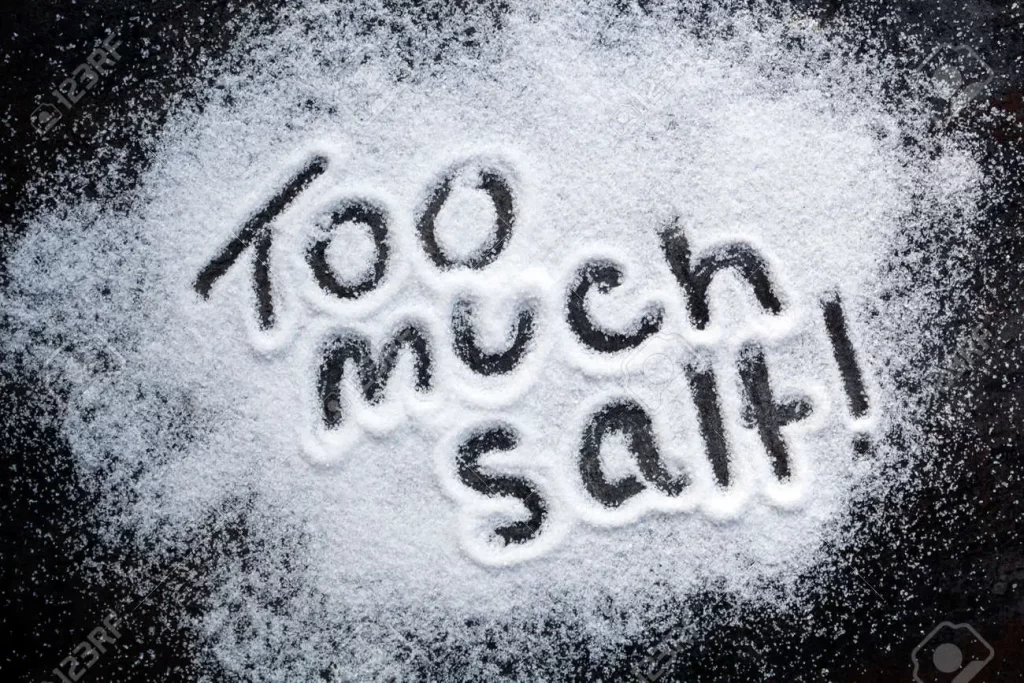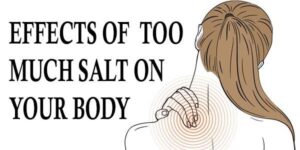Trends
7 Things That Happen To Your Body When You Consume Too Much Salt
In this article, we will discuss the 7 effects of consuming too much salt. Without a doubt, salt is an extremely important part…

In this article, we will discuss the 7 effects of consuming too much salt. Without a doubt, salt is an extremely important part of our diet.
It is a seasoning that adds sweetness to food and acts as a preservative. It has about 40% sodium and 60% chloride. However, A new study published in The New England Journal of Medicine found that there are an estimated 1.65 million deaths linked to high sodium consumption each year.
More so, it is essential to note that the human body requires a small amount of salt to conduct nerve impulses, contract and relax muscles, and maintain the proper balance of water and minerals.
So to prevent this increase in death and be aware of what may happen, here are 7 effects of consuming too much salt.
7 Effects of Consuming Too Much Salt
1. Increase In
2. Kidney Failure
3. Frequently You Become Thirsty
4. You Urinate A Lot
5. Increase in Risk of Heart Disease
6. Frequent Stomach Pain
7. You Experience Achy Bones

1. Increase In
One of the 7 effects of consuming too much salt is an increase in blood pressure. Although there are many ways you can have blood pressure, one could be too much sodium. In other words, the more sodium you have, the higher your blood pressure will be.
However, what you must know is that too much intake of salt makes it harder for them to get rid of fluid that you don’t need. As a result, your blood pressure goes up.
2. Kidney Failure
Since we know that among the 7 effects of consuming too much salt is high blood pressure. This spike in blood pressure can lead to kidney failure, as the spike put additional strain on the arteries leading to the kidney.
A 2013 study in the Journal of the American Society of Nephrology found that individuals with chronic kidney disease saw improved kidney function with decreased salt intake—and that may be because increased salt intake is what led to their kidney problems in the first place.
3. Frequently You Become Thirsty
If you’ve been really thirsty lately, it could be among the 7 effects of consuming too much salt. When that happens, you become dehydrated.
Your body pulls water from your cells, and you might start to feel very thirsty. Drinking water can help neutralize that salt and can freshen up your cells.
4. You Urinate A Lot
Another surprising thing among the 7 effects of consuming too much salt is that you begin to urinate a lot. If you feel like you’re urinating a lot, it could be a sodium issue.
Since salt impacts the levels of fluids in the body resulting in extreme thirst, once the thirst is satisfied then the body responds with an increase in bathroom breaks to help filter out the excess salt that caused the thirst in the first place.
5. Increase in Risk of Heart Disease
According to a study from the British Medical Journal, high sodium intake is directly linked to heart disease. And another study also affirmed that having excess salt in your diet doubles the threat of cardiovascular disease for diabetics.
6. Frequent Stomach Pain
Among the 7 effects of consuming too much salt is frequent stomach pain. Sodium can cause H pylori in the stomach, which means it may end up causing ulcers, stomach cancer, and other gastric issues.
It may become extremely painful, and can cause nausea and vomiting. Cutting the salt might be able to help ease the symptoms, so check with your doctor to see if that’s what is causing it.
7. You Experience Achy Bones
Salt intake can be a great obstacle to a sturdy skeleton. When you eat too much regular table salt, your kidneys can’t flush it out completely, and this increases calcium loss greatly.
A chronic calcium deficiency can result in weak bones, problems with your teeth, and can even cause the development of osteoporosis.
What to Do When You Consume Too Much Salt?
Foremost, you must drink sufficient amounts of water to help your body regain its desired sodium-to-water ratio.
More so, you can try eating foods that are rich in potassium, such as fruits, vegetables, legumes, nuts, seeds, and dairy. Together with sodium, potassium is a nutrient that plays a key role in maintaining your body’s fluid balance.
Finally, you may try to reduce the amount of salt you consume in other meals. Keep in mind that 78–80% of the salt you eat comes from processed foods or restaurant meals. This, however, will help prevent the 7 effects of consuming too much salt.
RECOMMENDED ARTICLEs
